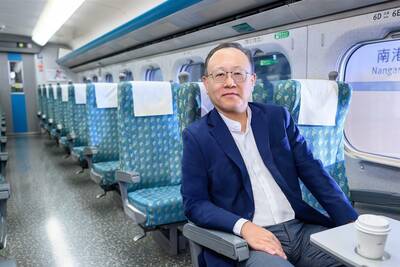DPP lawmakers accused officials from the Ministry of Economic Affairs yesterday of plundering a government fund and using the money for personal purposes.
DPP lawmakers Tang Huo-shen (湯火聖), Lin Yu-sheng (林育生) and Su Chih-fen (蘇治芬) made the accusations during a news conference yesterday morning.
They said that over the years, officials from the ROC Textile Industry Association have misused the Textile Industry Reform Fund, money compulsorily collected from local textile companies.
"By taking advantage of their positions, those association officials have misused interest payments earned from the fund for personal ends," Tang told reporters. "For example, they used the money to pay for overseas travel and other public relations costs."
The fund has accumulated nearly NT$600 million in assets.
Tang said that despite the introduction of trade rules in 1994, officials have failed to turn the fund over to the state treasury.
The association, established in 1977 as part of the government's effort to help the industry expand, consists of 45 board directors and 15 supervisory board directors.
But Lin said many of them concurrently work as board members despite potential conflicts of interests.
He noted that association officials took a trip to China in 1990 in the hope of setting up a distribution center there.
"They knew very well that neither government across the Strait would allow the establishment of such a center," Lin said. "But they went ahead and made the trip with money from the fund anyway."
The DPP lawmakers said they suspected that Wu Wen-ya (吳文雅), director-general of Bureau of Foreign Trade under the Ministry of Economic Affairs, was behind the "unworthy" fact-finding trips.
Wu and his counterpart at the Industrial Development Bureau are board directors of the association, which counts on the government for more than 50 percent of its budget this year.
Su said the association amended its charter last year, allowing its board members to use the fund itself, in addition to its interest payments, to fill budget shortfalls, among other things.
The lawmaker expressed worries that the association would eat up the fund in five years, if no measures were taken to stop the practice.
All three urged the Control Yuan to probe the matter.

The inspection equipment and data transmission system for new robotic dogs that Taipei is planning to use for sidewalk patrols were developed by a Taiwanese company, the city’s New Construction Office said today, dismissing concerns that the China-made robots could pose a security risk. The city is bringing in smart robotic dogs to help with sidewalk inspections, Taipei Deputy Mayor Lee Ssu-chuan (李四川) said on Facebook. Equipped with a panoramic surveillance system, the robots would be able to automatically flag problems and easily navigate narrow sidewalks, making inspections faster and more accurate, Lee said. By collecting more accurate data, they would help Taipei

STATS: Taiwan’s average life expectancy of 80.77 years was lower than that of Japan, Singapore and South Korea, but higher than in China, Malaysia and Indonesia Taiwan’s average life expectancy last year increased to 80.77 years, but was still not back to its pre-COVID-19 pandemic peak of 81.32 years in 2020, the Ministry of the Interior said yesterday. The average life expectancy last year increased the 0.54 years from 2023, the ministry said in a statement. For men and women, the average life expectancy last year was 77.42 years and 84.30 years respectively, up 0.48 years and 0.56 years from the previous year. Taiwan’s average life expectancy peaked at 81.32 years in 2020, as the nation was relatively unaffected by the pandemic that year. The metric

TAKING STOCK: The USMC is rebuilding a once-abandoned airfield in Palau to support large-scale ground operations as China’s missile range grows, Naval News reported The US Marine Corps (USMC) is considering new sites for stockpiling equipment in the West Pacific to harden military supply chains and enhance mobility across the Indo-Pacific region, US-based Naval News reported on Saturday. The proposed sites in Palau — one of Taiwan’s diplomatic allies — and Australia would enable a “rapid standup of stored equipment within a year” of the program’s approval, the report said, citing documents published by the USMC last month. In Palau, the service is rebuilding a formerly abandoned World War II-era airfield and establishing ancillary structures to support large-scale ground operations “as China’s missile range and magazine

Passengers on Taiwan High Speed Rail (THSR) will be required to use headphones and make phone calls in gangways under new “quiet travel” rules starting Sept. 22. THSR Chairman Shih Che (史哲) told media that THSR will run a three-month promotional campaign to ensure widespread adoption of the new rules. Those repeatedly ignoring the guidance face the potential termination of their transport contract, which can result in them getting escorted off the train, according to THSR. Shih shared his hope to cultivate an environment conducive to rest and reading for the train’s passengers, stating that these changes aim to “promote self-discipline” among passengers